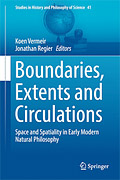
Koen Vermeir, Jonathan Regier (dir.)
<BR
– Opens up understanding of what space and spatiality could be and
can be, and presents early modern space as a concept of enormous
flexibility and centrality– Broadens appreciation of how spatiality can be constructed, over and
above the canonical spaces of Newtonian and relativistic physics– Presents an integrative view of late Renaissance and early modern
notions of space, and questions traditional historiography of the
Scientific Revolution– Offers a wide scope of sources, disciplines, geographical areas
– Offers a new perspective of canonical figures, like Kepler, Descartes,
Leibniz
This volume is an important re-evaluation of space and spatiality in the late Renaissance and early modern period. History of science has generally reduced sixteenth and seventeenth century space to a few canonical forms. This volume gives a much needed antidote. The contributing chapters examine the period’s staggering richness of spatiality: the geometrical, geographical, perceptual and elemental conceptualizations of space that abounded. The goal is to begin to reconstruct the amalgam of "spaces" which co-existed and cross-fertilized in the period’s many disciplines and visions of nature. Our volume will be a valuable resource for historians of science, philosophy and art, and for cultural and literary theorists.
About the authors :
Koen Vermeir is an Associate Research Professor (CR1) in the HPS Laboratory SPHERE (UMR 7219) at the Centre national de la recherche scientifique (CNRS). As a historian and philosopher, he has contributed to a wide array of fields. His main interests are in the history of the imagination and in the interaction between religion, science and technology. Additionally, he works on historiographical and methodological topics and on science policy. He is currently a member of the Global Young Academy. After studies in theoretical physics, philosophy and history of science, in Leuven, Utrecht and Cambridge, he held research positions at the Fund of Scientific Research-Flanders, the Max-Planck-Institute for the History of Science, Harvard University, and Harvard’s Radcliffe Institute for Advanced Studies. Vermeir was visiting fellow at Cambridge University and Cornell University, and visiting professor at the ETH Zürich. Vermeir is founder of and responsible for the research unit Histoire culturelle et interdisciplinaire des techniques (SPHERE) ; co-responsible for the research unit Recherches interdisciplinaires en histoire et philosophe des sciences (SPHERE) ; and former founding director of LIPSS, a science studies platform at the University of Leuven (Belgium). He is currently member of the editorial board of the journals Journal for Early Modern Studies, the journal Society and Politics and the journal Artefact : Histoire & techniques, and the book series "Studies in History and Philosophy of Science" and "International Archives of the History of Ideas". His work has been published in six different languages.
Jonathan Regier is currently a Postdoctoral Fellow at the Jockey Club Institute for Advanced Study, The Hong Kong University of Science and Technology. He is a chercheur associé with the HPS Laboratory SPHERE (UMR 7219) at the Centre National de la Recherche Scientifique (CNRS). He did his graduate work at Université Paris Diderot. His thesis and recent publications have focused on natural philosophy and the mathematization of nature during the sixteenth and seventeenth centuries. He is also pursuing research on the social integration and diffusion of new technologies.
TABLE OF CONTENTS
- Leibniz and the Petrifying Virtue of the Place, Ariew, Roger, 33-54
- Francesco Patrizi and the New Geometry of Space, Risi, Vincenzo, pp. 55-106
- The Inception of the Concept of Infinite Physical Space in the Time of Copernicus and Giordano Bruno, Seidengart, Jean, pp. 107-124
- The Perception of Spatial Depth in Kepler’s and Descartes’ Optics: A Study of an Epistemological Reversal, Bellis, Delphine, pp. 125-152
- Experimental Cartesianism and the Problem of Space, Dobre, Mihnea, pp. 153-178
- Putting the Devil on the Map: Demonology and Cosmography in the Renaissance, Maus de Rolley, Thibaut, pp. 179-207
- All Space Will Pass Away: The Spiritual, Spaceless and Incorporeal Heaven of Valentin Weigel (1533–1588) , Scafi, Alessandro, pp. 209-227
- ‘Borders,’ ‘Leaps’ and ‘Orbs of Virtue:’ A Contextual Reconstruction of Francis Bacon’s Extension-Related Concepts, Jalobeanu, Dana, pp. 229-254
- The Circulating Structure of Cosmological Space in the Seventeenth Century Chemical Tradition, Peterschmitt, Luc, pp. 255-273
:: Springer
:: Series "Studies in History and Philosophy of Science", Vol. 41
:: 273 pages
:: ISBN 978-3-319-41075-3
:: 2016
Also in this section :
- Écrits d’histoire et de philosophie des sciences
- Demain, la veille
- TECHNOCRATISME. LES GRANDS CORPS À LA DÉRIVE
- Epicureanism and Scientific Debates. Antiquity and Late Reception
- Indigenous Knowledge and Ethnomathematics
- Cultures of Computation and Quantification in the Ancient World.
- The Place of Archimedes in World History: Arguments and Counterarguments.
- Éthique et économie dans les philosophies anciennes
- Un regard sur les élites françaises : l’institut Auguste-Comte
- Concrete Numbers versus Abstract Numbers
- Companion to the Reception of Pythagoras and Pythagoreanism in the Middle Ages and the Renaissance
- De sex inconvenientibus. Traité anonyme de philosophie naturelle du XIVe siècle
- La (Re)construction française de l’analyse infinitésimale de Leibniz 1690-1706
- Mathematical Commentaries in the Ancient World. A Global Perspective
- The Oxford Handbook of the History of Quantum Interpretations
- L’intellect. Compendium du livre {De l’âme}
- Que veut dire penser ? Arabes et Latins
- Ordonner la diversité du vivant dans le Kitāb al-Ḥayawān d’al-ĞÂḥiẓ (776-868)
- Memory and Recollection in the Aristotelian Tradition
- Le plaisir et la nécessité



